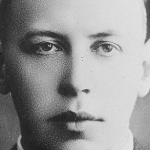How like the sky she bends above her child,
One with the great horizon of her pain!
No sob from our low seas where woe runs wild,
No weeping cloud, no momentary rain,
Can mar the heaven-high visage of her grief,
That frozen anguish, proud, majestic, dumb.
She stoops in pity above the labouring earth,
Knowing how fond, how brief
Is all its hope, past, present, and to come,
She stoops in pity, and yearns to assuage its dearth.
Through that fair face the whole dark universe
Speaks, as a thorn-tree speaks thro’ one white flower;
And all those wrenched Promethean souls that curse
The gods, but cannot die before their hour,
Find utterance in her beauty. That fair head
Bows over all earth’s graves. It was her cry
Men heard in Rama when the twisted ways
Her silence towers to Silences on high;
And, in her face, the whole earth’s anguish prays.
It is the pity, the pity of human love
That strains her face, upturned to meet the doom,
And her deep bosom, like a snow-white dove
Frozen upon its nest, ne’er to resume
Its happy breathing o’er the golden brace
That she must shield till death. Death, death alone
Can break the anguished horror of that spell.
The sorrow on her face
Is sealed: the living flesh is turned to stone;
Ah, yet, her woman’s love, so vast, so tender,
Her woman’s body, hurt by every dart,
Braving the thunder, still, still hide the slender
Soft frightened child beneath her mighty heart.
She is all one mute immortal cry, one brief
Infinite pang of such victorious pain
That she transcends the heavens and bows them down!
The majesty of grief
Is hers, and her dominion must remain
Eternal. Grief alone can wear that crown.


Comment form: